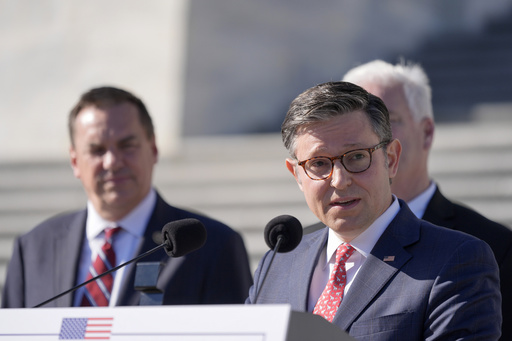WASHINGTON — Speaker Mike Johnson is initiating a significant campaign for his leadership position, which begins Wednesday with the internal elections within the House Republican leadership. This extensive effort will set the stage for a Congress that is expected to be heavily influenced by President-elect Donald Trump.
Johnson, together with his leadership team, is actively working behind the scenes to consolidate support in order to retain his role. While he currently lacks a formidable opponent, he still faces some dissent from hardline conservatives and members of the Freedom Caucus, who are withholding their votes in an effort to gain concessions as negotiations advance.
In advance of voting, Johnson is anticipated to host Trump, aiming to present a united front. “This leadership will hit the ground running to deliver President Trump’s agenda,” Johnson remarked on Tuesday as lawmakers returned to the Capitol.
Johnson’s rise to the speakership has been remarkable. He was chosen as a last-minute solution to succeed the ousted former speaker Kevin McCarthy more than a year ago. He swiftly aligned himself with Trump’s agenda during the elections, positioning himself as a key player.
As Johnson describes it, he views Trump as the “coach,” while he himself plays the “quarterback” role for the GOP team gearing up for the upcoming year. Johnson is fully supportive of Trump’s priorities, which include ambitious policies such as mass deportations, tax reductions, a reduction of the federal workforce, and adopting a more assertive stance in international relations. Together, they are crafting what Johnson calls an ambitious 100-day agenda, aiming to rectify what he sees as the mistakes made during Trump’s earlier term, where Congress was unprepared and squandered valuable time.
“We will be ready on day one,” Johnson affirmed.
Johnson expects to lead the House under a unified government, with Trump at the helm of the White House and Republicans controlling the Senate. However, the House itself is expected to remain narrowly divided, as control is still pending in some closely contested races, particularly in California.
Challenges associated with a slim majority in the House, which affected Johnson’s first year as speaker — where his plans were often met with revolt — are likely to continue into the new year, potentially resulting in further chaotic governance.
To secure the GOP nomination for speaker during Wednesday’s closed-door voting, Johnson needs only a simple majority. However, to officially assume the role when the new Congress convenes on January 3, he will require 218 votes from the full House. By contrast, McCarthy faced a protracted battle, needing 15 rounds of voting over the course of a week to obtain the gavel in 2023.
Trump’s involvement has complicated Johnson’s situation further by selecting House Republicans for his administration, which reduces their numbers. Some within the party are suggesting delaying the House leadership elections until there is clarity on the control of the chamber.
Nevertheless, with Trump in office, Johnson may benefit from a stretch of goodwill among his peers as Republicans are eager to dismantle traditional governing norms and formalize Trump’s second-term aspirations.
“His challenge is what it’s always been,” Rep. Ralph Norman, R-S.C., a member of the Freedom Caucus, commented about Johnson. Yet, he added, “With Trump in charge, it’ll be easier for him to deliver.”
Conservatives within the party have been contemplating whether to put forward their own candidate as a message to Johnson while pushing for their priorities, mimicking the strategy they used with McCarthy to secure concessions, especially concerning budget cuts.
As Johnson embarks on drafting the budget for the upcoming year, including utilizing a budget reconciliation process to facilitate the passage of Trump’s agenda through both the House and Senate with simple majority votes, conservatives are eager for him to include their policy priorities in this legislation.
Democrats, who have assisted Johnson on several occasions in maintaining government functionality — notably providing votes necessary to fund the government and staving off Rep. Marjorie Taylor Greene’s effort to remove him — are unlikely to extend that support in the coming year. “Voters voted for them,” stated Rep. Pramila Jayapal, D-Wash., chair of the Congressional Progressive Caucus. “Let’s see what they do.”
In addition to the speaker election on Wednesday, Republicans will also elect their other leadership positions.
Majority Leader Steve Scalise, also from Louisiana, and GOP Whip Tom Emmer from Minnesota, are expected to be easily re-elected to their positions. The position of the House GOP conference chair, however, is up for grabs due to Trump’s appointment of Rep. Elise Stefanik from New York as his ambassador to the United Nations, which opens the door for competition among several GOP lawmakers.


